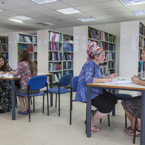This website uses cookies to ensure you get the best experience on our website. privacy policy and terms of use.
JCT students and alumni develop solutions to protect Israel on home and cyber frontsAt the outbreak of the war, JCT's Schreiber Lev Tech Entrepreneurship Center and its Take Action program, called on students and alumni to come up with solutions for better practices in an emergency situation. On the civil front, JCT graduate Rami Triestman, has created a web-based solution enabling civil defense units to communicate with each other during emergencies if internet service is down. This solution operates via telephone rather than cellular network, and consequently is not dependent on internet connectivity. It enables voice messages to be transmitted to alert civil defense units in times of emergency, even if traditional internet services are malfunctioning. Meanwhile, with the internet inundated with anti-semetic content, many Jewish advocates have felt frustrated in their inability to respond to such harmful rhetoric in an efficient manner. |
|
During this year's JCT hackathon, students, Ido Schwartz, Ori Kessler and Eliya Livshitz, came up with an idea that went on to win first place at a national Hackathon to find technological solutions to help Holocaust survivors and the challenges of Holocaust education and remembrance. They created Savee, a tool using generative AI technology, which the students have now further developed to counter anti-Israel and anti-Semetic sentiments online. Savee reviews the written content and concurrently gathers verified information from an established online database. It then generates a precise, fact-based response to refute the content. To date, Savee has responded to 700 posts per day, reaching 7.3 million users in order to combat antisemitism, Jew-hatred, and Holocaust denial content on social media. |
|
This past week, 15 JCT students together with students from other Jerusalem academic institutions took part in a hackathon organized by the Jerusalem high-tech community, venture capital funds, and entrepreneurs under the auspices of the Ministry of Foreign Affairs. The aim of the hackathon was to enhance Israel’s PR efforts across a variety of digital platforms. |

Prof Foxbrumer was recognized by president for contribution to Swords of Iron...

JCT Teams Up with MMY to offer academic programming to women studying in the...

Dr Yossi Golobchiev from JCT's Electronics department discusses the recent...